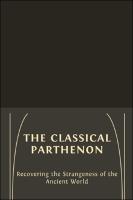The Classical Parthenon
Recovering the Strangeness of the Ancient World
Author(s)
st. clair, william
Contributor(s)
Barnes, Lucy (editor)
Collection
ScholarLedLanguage
EnglishAbstract
Complementing Who Saved the Parthenon? this companion volume sets aside more recent narratives surrounding the Athenian Acropolis, supposedly ‘the very symbol of democracy itself’, instead asking if we can truly access an ancient past imputed with modern meaning. And, if so, how?
In this book William St Clair presents a reconstructed understanding of the Parthenon from within the classical Athenian worldview. He explores its role and meaning by weaving together a range of textual and visual sources into two innovative oratorical experiments – a speech in the style of Thucydides and a first-century CE rhetorical exercise – which are used to develop a narrative analysis of the temple structure, revealing a strange story of indigeneity, origins, and empire.
The Classical Parthenon offers new answers to old questions, such as the riddle of the Parthenon frieze, and provides a framing device for the wider relationship between visual artefacts, built heritage, and layers of accumulated cultural rhetoric. This groundbreaking and pertinent work will appeal across the disciplines to readers interested in the classics, art history, and the nature of history, while also speaking to a general audience that is interrogating the role of monuments in contemporary society.
Keywords
Athenian Acropolis;classical Athenian worldview;narrative analysis;Parthenon;symbol of democracy;temple structureDOI
10.11647/OBP.0279ISBN
9781800643444, 9781800643451, 9781800643475, 9781800643482, 9781800643499, 9781800646780, 9781800643468Publisher
Open Book PublishersPublisher website
https://www.openbookpublishers.com/Publication date and place
Cambridge, 2022Classification
Greece
History and Archaeology
c 1500 onwards to present day
Social groups, communities and identities


 Download
Download Web Shop
Web Shop